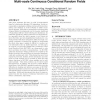CIKM
2009
Springer
14 years 6 months ago
2009
Springer
This paper addresses the issue of social recommendation based on collaborative filtering (CF) algorithms. Social recommendation emphasizes utilizing various attributes informatio...
CIKM
2009
Springer
14 years 6 months ago
2009
Springer
Understanding intents from search queries can improve a user’s search experience and boost a site’s advertising profits. Query tagging via statistical sequential labeling mode...
CIKM
2009
Springer
14 years 6 months ago
2009
Springer
Sets of named entities are used heavily at commercial search engines such as Google, Yahoo and Bing. Acquiring sets of entities typically consists of combining semi-supervised exp...
CIKM
2009
Springer
14 years 6 months ago
2009
Springer
Web search engines are often implemented as centralized systems. Designing and implementing a Web search engine in a distributed environment is a challenging engineering task that...
CIKM
2009
Springer
14 years 6 months ago
2009
Springer
Due to an increasing volume of XML data, it is considered prudent to store XML data on an industry-strength database system instead of relying on a domain specific application or...
CIKM
2009
Springer
14 years 6 months ago
2009
Springer
We investigate the automatic generation of topic pages as an alternative to the current Web search paradigm. We describe a general framework, which combines query log analysis to ...
CIKM
2009
Springer
14 years 6 months ago
2009
Springer
Trust plays important roles in diverse decentralized environments, including our society at large. Computational trust models help to, for instance, guide users’ judgements in o...
CIKM
2009
Springer
14 years 6 months ago
2009
Springer
This paper proposes the integration of semantic information drawn from a web application’s domain knowledge into all phases of the web usage mining process (preprocessing, patte...
CIKM
2009
Springer
14 years 6 months ago
2009
Springer
Support vector machines (SVMs) have been widely used in multimedia retrieval to learn a concept in order to find the best matches. In such a SVM active learning environment, the ...
CIKM
2009
Springer
14 years 6 months ago
2009
Springer
To increase the relevancy of local patterns discovered from noisy relations, it makes sense to formalize error-tolerance. Our starting point is to address the limitations of state...




